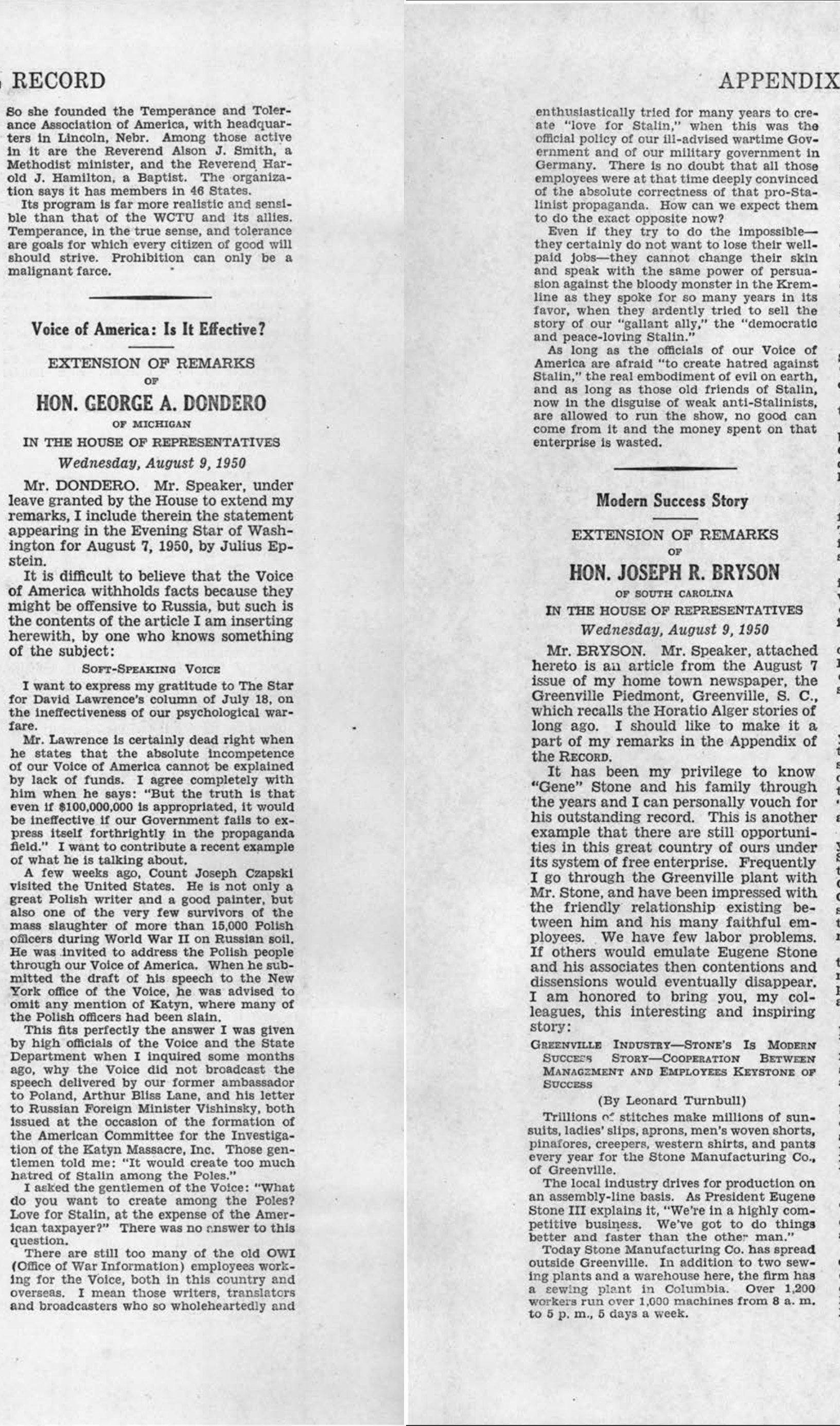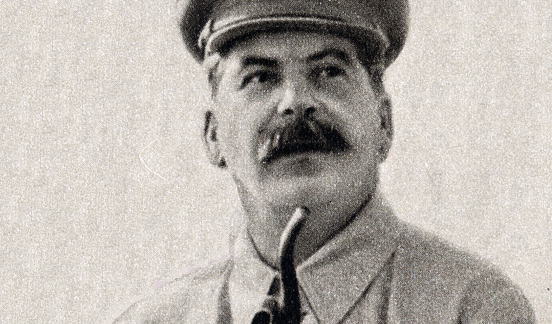By Ted Lipien
With the exception of a few broadcasters who were quickly silenced or marginalized by the management of the Office of War Information (OWI), the entire wartime Voice of America (VOA) glorified Soviet dictator Joseph Stalin not only because at that time the Red Army was fighting Hitler’s Germany, Russia was America’s most valuable military ally and President Roosevelt called the Soviet leader “Uncle Joe,” but also because many of these journalists and their bosses were fooled by Soviet disinformation. They became unwitting agents of influence for a mass murderer and a highly repressive political system which to them appeared highly progressive.
I know of only one World War II era Voice of America broadcaster who had refused to read Soviet propaganda lies and resigned. His name was Konstanty Broel Plater. He was a former Polish diplomat from an aristocratic family who before joining VOA in 1942 was also a radio journalist in the United States. There may have been others who had resigned from VOA for the same reason, but I have not found them during my research. Voice of America’s first chief news writer and editor, Howard Fast, who was recruited for this job in 1943 by VOA’s first director, John Houseman, was later a Communist Party activist, reporter for the party’s newspaper, and the recipient of the 1953 Stalin International Peace Prize.
Due to the intervention in the White House by liberal but anti-communist Roosevelt Administration officials in the State Department, John Houseman was forced to resign in 1944 for hiring pro-Moscow Communists, but the real reason for Houseman’s resignation was kept secret for several decades.
While not directly responsible for the Soviet domination of East-Central Europe, which for several decades kept about 80 million people under brutal communist rule and economic misery, the early Voice of America officials and journalists who saw Soviet Russia as a model state of social progress supported with their propaganda the establishment of pro-Soviet regimes in the region and made it easier for Stalin to achieve his foreign policy aims for as long as they were employed by the U.S. government. Some stayed in their VOA jobs until the 1950s.

A cropped section of a photograph of Stalin taken in 1937. The original image depicts Molotov to his left, and Voroshilov to his right. Taken in 1937; published in 1940.
But by the early 1950s, the Voice of America slowly moved away from its earlier fascination with Joseph Stalin and Soviet communism. Most of the pro-Soviet VOA officials and broadcasters were quietly dismissed by the Truman Administration and replaced in VOA’s foreign language services by journalists who were in many cases refugees from communism. A few of the World War II era VOA employees resigned on their own and went to work for communist regimes behind the Iron Curtain.
Contrary to popular belief, it was the Truman Administration and even earlier to some degree the Roosevelt Administration who were responsible for getting rid of most of the Communists, Soviet sympathizers and some radical Socialists among early Voice of America managers and employees rather than the infamous Senator Joseph McCarthy (R-WI). When Senator McCarthy made his wild and mostly false accusations of communist treachery inside the U.S. government, there were hardly any Soviet sympathizers left at the Voice of America who could be found. Those who were fired earlier or forced to resign without much publicity during the Democratic administrations of President Roosevelt and President Truman, were in almost most cases not Soviet spies but rather naive idealists who were all too easily deceived by Soviet propaganda. But the journalistic failure and the damage done by these individuals to millions of people behind the iron and bamboo curtains was so enormous that subsequent generations of VOA managers and journalists wanted to believe that it never happened and created a misleading narrative of how the Voice America operated in its early years. With the passage of time, the false narrative was accepted as being truthful.
Few original Voice of America World War II recordings and scripts have been preserved, but Sandro Gerbi, a nephew of one of the early VOA Italian broadcasters, Giuliano Gerbi (1905-1976), whose on-air name was Mario Verdi, found a VOA script dated December 21, 1943 praising Joseph Stalin, which was recorded by his uncle. Voice of America’s support for the Red Army soldiers fighting Hitler’s armies would have been understandable, but World War II VOA broadcasters took it much further, presenting Stalin as the guarantor of peace and progress after the war. At about the same time, VOA Polish desk broadcasters produced propaganda in support of radical socialism in post-war Poland.
Today Marshal Stalin is 64. It is perhaps the happiest birthday of the Soviet Statesmans’s entire political and military life. The most sumptuous gift has come from his soldiers. The most gratifying reward for him is the consciousness that he has done everything in his power for the good of his Country. His talents had already manifested themselves through his policies in times of peace. Through an intense campaign to raise the spirit of the Russian people, to give this people, enslaved by the Tsars, the awareness of their own national strength (December 21, 1943). 1
Sandro Gerbi said at the Americordo Conference at Columbia University in 2010 and wrote in his article posted on the Centro Primo Levi New York website that “There are far too many such examples to mention all of them here. The documents are available to scholars wanting to consult them.” 2
A former foreign language editor with the U.S. Office of War Information (OWI) propaganda agency, Julius Epstein, a Jewish refugee from Nazi Germany who in his youth was briefly a Communist Party member, was a journalist responsible for exposing the “Love for Stalin” at the World War II Voice of America. His strong post-war public criticism of the management of the Voice of America for allowing VOA programs to become a platform for Soviet propaganda during and for several years after the war spurred the establishment in the early 1950s of Radio Free Europe and Radio Liberation, which was later renamed Radio Liberty.
“There are still too many of the old OWI [Office of War Information] employees working for the Voice, both in this country and overseas. I mean those writers, translators and broadcasters who so wholeheartedly and enthusiastically tried for many years to create ‘love for Stalin,’ when this was the official policy of our ill-advised wartime Government and of our military government in Germany. There is no doubt that all those employees were at that time deeply convinced of the absolute correctness of that pro-Stalinist propaganda. How can we expect them to do the exact opposite now?” 3
These observations by Julius Epstein were inserted by Congressman George A. Dondero (R-MI) in the Congressional Record on August 9, 1950. The quote was from the article which was published in the Evening Star Washington newspaper on August 7, 1950. The article was titled “Soft-Speaking Voice.” The Congressional Record entry was titled, “Voice of America: Is It Effective?”
Epstein’s article focused on how the Voice of America tried to censor former Polish military officer, writer and painter Józef Czapski, when in 1950 he spoke in a VOA program about the 1940 Soviet massacre of about 22,000 Polish POWs executed on Stalin’s orders by the NKVD secret police. The Soviets denied committing the murder and maintained their lie for several decades. The Voice of America supported what became known as the Katyn Lie until at least 1945 and later restricted reporting on it until the Truman Administration’s reforms in the early 1950s resulted in personnel changes and removing such restrictions.
In introducing the article, Congressman Dondero said:
I include therein the statement appearing in the Evening Star of Washington for August 7, 1950, by Julius Epstein.
It is difficult to believe that the Voice of America withholds facts because they might be offensive to Russia, but such is the contents of the article I am inserting herewith by one who knows something of the subject:
SOFT-SPEAKING VOICE

Congressman George A. Dondero, August 9, 1950, Congressional Record- the 81st Congress, Second Session, Appendix. Part 17 ed. Vol. 96. pp. A5744-A5745.
Notes:
- Sandro Gerbi, “Italy and the Voice of America” (Columbia University: Centro Primo Levi New York, 2010), https://primolevicenter.org/italy-and-the-voice-of-america/. ↩
- Sandro Gerbi, “Italy and the Voice of America” (Columbia University: Centro Primo Levi New York, 2010), https://primolevicenter.org/italy-and-the-voice-of-america/. ↩
- Congressional Record: Proceedings and Debates of the 81st Congress, Second Session, Appendix. Part 17 ed. Vol. 96. August 4, 1950, to September 22, 1950. Washington, DC: United States Government Printing Office, 1950, pp. A5744-A5745, https://www.govinfo.gov/app/details/GPO-CRECB-1950-pt17/GPO-CRECB-1950-pt17-1. ↩



Add Comment